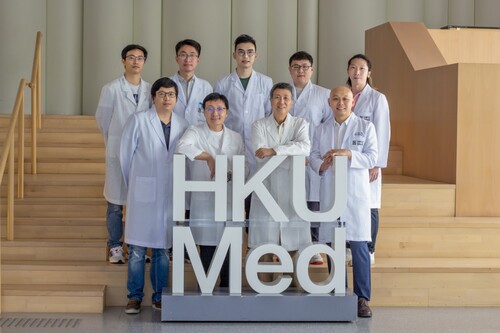Dec 08, 2023
Press Release: HKUMed reveals new strategy for updating vaccines against evolving COVID-19 variants

Led by Professor Huang Jiandong, Chair Professor of Synthetic Biology, School of Biomedical Sciences, HKUMed (front row, second right), the research team has developed a novel method for dynamic vaccine updates to combat the ever-changing SARS-CoV-2 virus.
Researchers from the LKS Faculty of Medicine, the University of Hong Kong (HKUMed) and the Shenzhen Institute of Advanced Technology (SIAT) have developed a novel method for dynamic vaccine updates to combat the ever-changing SARS-CoV-2 virus, which caused the COVID-19 pandemic. The findings, published in the journal Cell Host & Microbe [link to publication], revealed that a vaccine booster based on the older SARS-CoV-1 strain may provide longer-lasting and broader protection after two doses of an ancestral strain vaccine.
Background
Amid the ongoing COVID-19 pandemic and the emergence of reinfections, there has been growing concern about the effectiveness of the current vaccines against the rapidly evolving virus. To address this problem, it is crucial to continuously update new vaccines to keep up with evolution of the COVID-19 virus (i.e. SARS-CoV-2).
SARS-CoV-2 presents unique challenges for selecting booster vaccine strains owing to its accelerated episodic mutations and immune imprinting, which makes it difficult to select effective vaccine strains. Additionally, the saltational evolution of SARS-CoV-2 through recombination further complicates the selection process. As new strains continue to emerge, the necessity for booster shots that target these specific variants becomes apparent. However, the current strategy may not be sufficiently agile to respond to the rapid evolution of COVID-19, which highlights the need for a more effective strategy.
Led by Professor Huang Jiandong, Chair Professor of Synthetic Biology, School of Biomedical Sciences, HKUMed, the research team introduced the concept of 'antigenic distance' and 'antigen field' to select the optimal booster vaccine seed strain. By using the 'antigen distance' model, the researchers quantitatively measured immune escape between different mutant strains, enabling them to predict the potential protection range of various strains as booster vaccines. Their findings suggest that a booster vaccine based on the SARS-CoV-1 strain, the original virus that caused the 2002-2004 SARS outbreak, may offer broader and longer-lasting protection against COVID-19 variants.
The researchers validated these findings through experiments with human serum samples and a mouse model. Based on antigenic distance, several candidate vaccines, including the spike protein from the ancestral SARS-CoV-2, the Delta variant, the Omicron variant, SARS-CoV-1, and MERS-CoV were experimentally evaluated in mice following two doses of the mRNA vaccine. The results showed that the SARS-CoV-1 booster shot performed better than other candidate vaccines in terms of specific antibody levels, neutralising antibody levels, and protection durability. The findings suggest that designing new COVID-19 booster shots based on antigen distance could be a valuable strategy for addressing future SARS-CoV-2 variants.
This study introduces a new approach for designing COVID-19 booster shots based on the concept of antigen distance. A SARS-CoV-1-based booster provides better protection against emerging SARS-CoV-2 variants, including multiple Omicron strains. The 'antigen field' concept also offers a new framework for understanding the interaction between the immune system and foreign antigens, with potential implications for future vaccine and immunotherapy development against other infectious diseases and even cancers.
About the research team
The collaborative study was led by Professor Huang Jiandong, Chair Professor of Synthetic Biology, School of Biomedical Sciences, HKUMed; Dr Zhang Baozhong, Honorary Assistant Professor, School of Biomedical Sciences, HKUMed; Associate Investigator, Shenzhen Institute of Advanced Technology; Dr Chu Hin, Assistant Professor, Department of Microbiology, School of Clinical Medicine, HKUMed; and Dr Hu Yefan, former PhD student, Department of Medicine, School of Clinical Medicine, HKUMed, along with other researchers from HKU and SIAT.
Acknowledgements
The research was supported by various funding sources, including the National Key R&D Program of China, the Health and Medical Research Fund, the formerly Food and Health Bureau (now Health Bureau), the Government of the Hong Kong Special Administrative Region, and the Guangdong Science and Technology Department.
Media enquiries
Please contact LKS Faculty of Medicine of The University of Hong Kong by email (medmedia@hku.hk).

